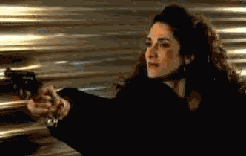|
Fraser describes the bond between them as having known her across a thousand lifetimes. I think she felt the same way. She describes her feelings as hate and love. I love the scene in the peep show when he asks her in a heart-rending manner, "What do you want, Victoria?" She replies, "You." She asks, "Why do you think I did all this?" She tells him, "I need you," and "I want you to go away with me." When he replies that he can't do that she says, "You don't have much to stick around here for." She wants to alienate him from everything he cares about so that there is no option left for him but to go with her. Also, she says, "You won't like prison." When he turns her down the first time, she then tells him he has to go make the exchange for the diamonds - a risky enterprise, to say the least. When he turns her down the second time, in the car, she is about to shoot him with Ray's back-up gun. "No loose ends." She can't bring herself to do it, however. The last time she asks him to go with her, he is willing. She's an evil witch from the depths of hell but I think she really loved Fraser in her own twisted, warped, angry way.
Fraser is in love. Fraser is after all a human being. This is not a man who falls in love every other day. He is in his thirties and Victoria is the only woman he has ever loved. For all we know (and it is all we know), judging by his standards of conduct, she may be the only woman to whom he has made love. He probably hasn't gotten close enough to any other woman before, and we certainly don't see any evidence of any closeness to any woman, after Victoria. The circumstances of their meeting have determined the closeness and hence the intensity of the love that developed.
Benton Fraser is the perfect candidate for this kind of all-consuming, judgment-wrecking, life-destroying love. He is an innocent--not entirely naive--but an innocent nevertheless who shared a near death experience with a beautiful woman whom he credits with helping to keep him alive. He is deeply repressed sexually partially because of his sense of honor and partially because--it's just his personality. When he falls in love, it has to be very intense. Victoria apparently loves him too. This is a perfect formula for disaster. She is evil. He recognized the "darkness inside her" but although he is committed to performing his duty, he cannot help the way he feels about her. This is in the dramatic tradition of the fatal flaw of the hero. In this case, of course, it is not fatal because this is a television series.
Our hero who is always devoted to maintaining the right, who holds himself to the highest ideals is brought low by love. Mr. Efficient and Rational exercises poor judgment, forsakes his ideals, refuses to see reality because he is blinded by love. He can't think straight. He is only human after all. He tries to be pure of heart but as a human being, he fails.
Fraser is thrown almost totally off course by Victoria. He is experiencing something that he can't handle. Fraser loses everything--ideals, self, sense of justice, ideals of friendship--when he sees her leaving and calling to him. He loves her, wants to be with her, and knows he will regret it if he doesn't go with her. He'll probably regret it if he does but he is beyond thinking now. He has twice before turned her down when she demanded that he go with her but now the reality of her departure is too much for him. He snaps. The good, true, and loyal Fraser is lost to the love for a woman that he feels he has known "forever."
They were alone together for a week after the robbery. He describes the scene before he turns her in, "We camped that night, just outside the town within sight of the church's steeple. And I held her in my arms. And she asked me to let her go." The imagery evoked is one of a wedding and union. Fraser is not one to take relationships lightly and although he fulfilled his duty by turning Victoria in, his extreme guilt concerning their union is probably what helps to cloud his judgment and confuse his usually logical mind in this episode. His love for Victoria that developed during that week together culminated in their union and hence Fraser's extreme guilt over turning her in.
The scene with the candles is very moving. We see him weak and crying because he "needs." Whatever love he feels he hasn't had in his life is now wrapped up in his idea of the love that he feels for this woman. As he says in "Letting Go," "I can understand that you could love someone so much that you would do almost anything for them." In the end, Fraser would do almost anything for Victoria.
|
|
